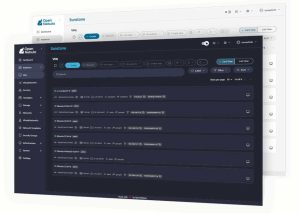OpenNebula 7.0 ‘Phoenix’ Released, Enabling Next-Gen Cloud-Edge Revirtualization and Sovereign AI Factories
Release delivers breakthrough enhancements for VMware re-virtualization, AI factories, hybrid multi-provider cloud, and edge deployments
This is a Press Release edited by StorageNewsletter.com on July 21, 2025 at 2:01 pmOpenNebula Systems announced OpenNebula 7.0 ‘Phoenix’, the 1st release in its next-gen 7.x series, marking a major architectural leap for cloud and edge computing.
This transformative release introduces breakthrough capabilities across storage, backup, intelligent resource management, hybrid multi-cloud integration, and GPU-accelerated AI workloads – providing organizations with a sovereign, future-proof alternative to legacy virtualization solutions.
“This release is more than just an update – it introduces major innovations and marks a significant leap forward, empowering our users with advanced AI, edge, and sovereign cloud capabilities. These breakthroughs are the result of our close collaboration with leading cloud players in the IPCEI-CIS initiative,” said Dr. Ignacio M. Llorente, CEO, OpenNebula Systems.
Click to enlarge
 OpenNebula 7.0 streamlines the transition from proprietary platforms, like VMware, with AI-powered OneDRS scheduling, native NetApp iSCSI integration, Veeam backups, OVA import, and a redesigned LVM backend that supports snapshots, backups, and improved performance. Shared storage is simplified with automated NFS mount configuration, while local datastore operations have been optimized with a complete rewrite.
OpenNebula 7.0 streamlines the transition from proprietary platforms, like VMware, with AI-powered OneDRS scheduling, native NetApp iSCSI integration, Veeam backups, OVA import, and a redesigned LVM backend that supports snapshots, backups, and improved performance. Shared storage is simplified with automated NFS mount configuration, while local datastore operations have been optimized with a complete rewrite.
This release introduces incremental Ceph backups and full backup support for LVM datastores, ensuring enterprise-grade data protection. OneDRS, OpenNebula’s AI-powered alternative to VMware DRS, offers predictive scheduling, customizable automation levels, and flexible migration thresholds. Combined with the new time series monitoring framework, it enhances optimization and capacity planning.
Cluster Quotas enable granular resource control, while Generic Quotas track resources such as vGPUs or software licenses – particularly valuable for edge or multi-tenant environments.
Support for AI workloads is a key focus, with enhanced PCI passthrough and full compatibility with NVIDIA-mediated vGPU devices. GPU allocation is flexible and scalable, with configurable vGPU profiles and PCI assignments at the host or cluster level.
AI appliances have been upgraded: the Ray Appliance now includes vLLM support, OpenAPI compatibility, Hugging Face integration, model quantization, and multi-GPU configurations. The NVIDIA Dynamo Appliance enables production-grade inference workloads. Integration with NVIDIA NIM and advanced networking through BlueField-3 DPUs reinforces OpenNebula’s role in building sovereign AI factories at scale.
OpenNebula 7.0 is also completely redefining its hybrid cloud provisioning engine, expanding support for additional cloud providers and simplifying cluster setups. ARM-based architectures are now supported, with packages and Marketplace appliances for the aarch64 ecosystem.
Networking enhancements include transparent proxying for easier VM access to services like OneGate, and VLAN filtering for improved isolation in Linux bridge environments.
The Sunstone GUI has been modernized with better accessibility, navigation, and data visualization in order to access and leverage all the new innovations introduced in OpenNebula 7.0. A new end-user cloud view offers real-time performance metrics, and Dynamic Tabs allow direct integration of third-party tools. Other enhancements include VM Template Profiles and improved VNC security and performance.
Version 7.0 also boosts Kubernetes integration with a new CAPI/Rancher Appliance for managing RKE2 clusters, enabling deployment and management directly from Rancher’s UI. Improved support for Windows guest operations and OneFlow support for Virtual Router–based roles are included as well.
OpenNebula is a fully open source technology, and users now benefit from a new built-in migrator package to upgrade from version 6.10 – streamlining the adoption of the platform’s latest innovations. This release reflects a broader transformation: organizations rising from aging infrastructure and rigid vendor lock-in toward open, intelligent, and sovereign cloud solutions. Many of these innovations were developed under the €3 billion IPCEI-CIS initiative, underscoring OpenNebula’s strategic role in building next-gen cloud capabilities.
Resource:
OpenNebula 7.0 ‘Phoenix’














 Subscribe to our free daily newsletter
Subscribe to our free daily newsletter

